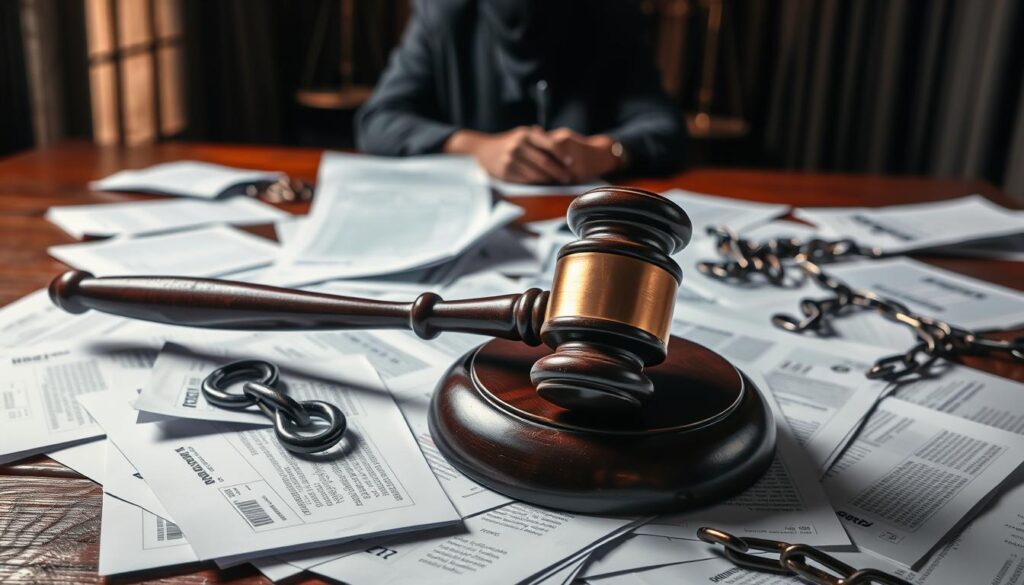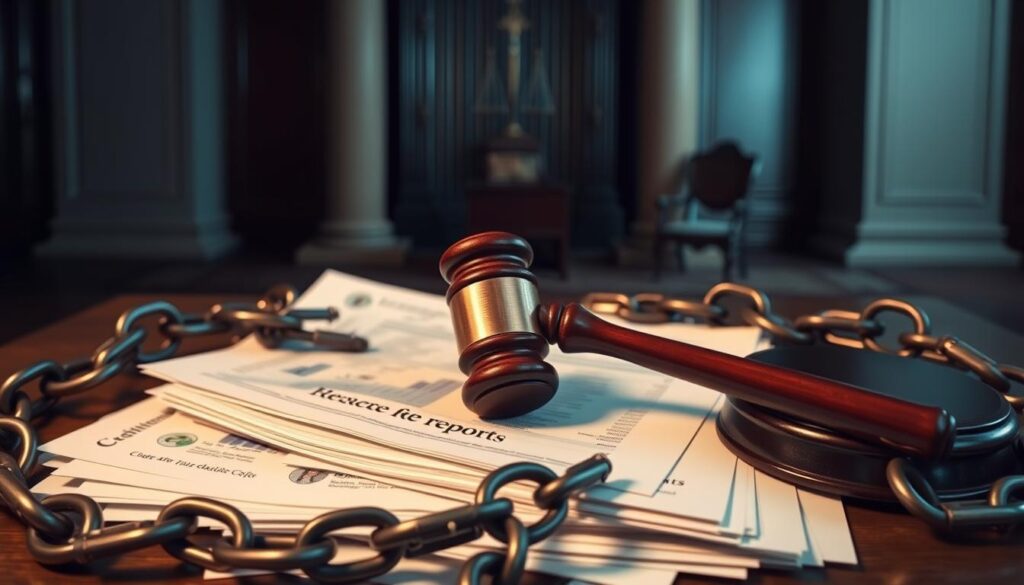Credit report mistakes can harm your financial life. They can lower your credit score and make borrowing harder. The Fair Credit Reporting Act (FCRA) gives you rights to fix these errors.
This guide shows how to use legal help for credit reporting errors. You’ll learn to protect your financial health and correct inaccuracies.
Key Takeaways
- Understand common credit report mistakes and their impact on your financial life.
- Learn about your legal rights under the FCRA to dispute inaccurate credit information.
- Discover the steps to effectively file a dispute with credit bureaus and gather supporting documentation.
- Explore the benefits of seeking assistance from credit repair professionals and credit report dispute lawyers.
- Understand the legal options for resolving credit reporting errors, including filing a lawsuit against credit bureaus.
Understanding Credit Reporting Errors
Credit reporting errors can harm your financial health. These mistakes range from wrong personal details to incorrect account histories. They can damage credit scores and make getting loans or jobs harder.
It’s vital to know common credit report mistakes. Understanding their potential consequences helps you protect your financial future.
Common Credit Report Mistakes
- Incorrect personal information, such as name, address, or Social Security number
- Inaccurate account details, including account balances, payment histories, and credit limits
- Fraudulent accounts or identity theft entries on your credit report
- Accounts that have been closed but still appear as open
- Duplicate accounts or incorrect account statuses
Impact of Inaccurate Credit Information
Credit report errors can cause serious problems. Inaccurate credit information can lead to a lower credit score. This makes getting credit or good interest rates harder.
Errors can also affect job applications. You might pay more for insurance, rentals, or other financial services. Fixing these issues is crucial for your financial health.
“Credit report errors can have a devastating impact on your financial life, but you have the legal right to fix these mistakes.”
Your Legal Rights Under the Fair Credit Reporting Act
The Fair Credit Reporting Act (FCRA) protects consumers in credit reporting. It empowers individuals to dispute fair credit reporting act violations. The law holds credit agencies accountable for accurate information.
The FCRA grants consumers several important rights. These rights help maintain credit report accuracy. They also ensure credit bureaus provide reliable information.
Under the FCRA, consumers have the right to:
- Access their credit reports for free on an annual basis.
- Dispute any inaccurate, incomplete, or unverified information on their credit reports.
- Receive a response from credit bureaus within 30 days regarding the investigation of a dispute.
- Receive a free credit report if a company takes adverse action against them, such as denying a loan or job application, based on their credit information.
- Seek damages from credit reporting agencies for fair credit reporting act violations that result in financial harm.
Knowledge of FCRA rights helps consumers protect their financial wellbeing. It allows them to take action against inaccuracies. They can also hold credit bureaus responsible for reliable information.
“The Fair Credit Reporting Act is a powerful tool that gives consumers the ability to dispute and correct errors on their credit reports.”
Understanding fair credit reporting act violations is crucial. It helps individuals safeguard their financial health. They can also ensure access to the credit they deserve.

Disputing Credit Report Errors with Credit Bureaus
Found mistakes in your credit report? Act fast to dispute them with credit bureaus. Removing wrong entries can protect your financial health.
The process might seem tough. But with the right steps, you can fix these errors effectively.
Steps to File a Dispute
- Identify the specific errors in your credit report and gather all relevant documentation.
- Draft a detailed, written dispute letter to each credit bureau reporting the inaccurate information.
- Submit your dispute letter along with any supporting evidence, such as copies of bills, statements, or other documents that prove the errors.
- Follow up with the credit bureaus to ensure your dispute is being investigated and that the errors are corrected in a timely manner.
Gathering Supporting Documentation
Strong evidence is key when disputing credit report errors. Here’s what you might need:
- Copies of bills, statements, or other documents that show the correct information
- Correspondence with creditors or other parties involved in the disputed information
- Proof of identity, such as a driver’s license or passport
Clear, complete proof boosts your chances of success. It helps remove wrong entries and improve your credit score.
Stay persistent and organized when disputing credit report errors. Follow the right steps and provide needed proof.
Work with credit report dispute lawyers for best results. They’ll help ensure your report shows your true financial history.
Seeking Assistance from Credit Repair Professionals
Credit reporting can be complex and overwhelming. Credit repair professionals offer expert guidance to fix credit report mistakes legally. They help you achieve the credit score you deserve.
Credit counselors and attorneys are valuable allies in pursuit of credit report accuracy. They have the knowledge to address intricate credit reporting issues. These experts ensure your rights under the Fair Credit Reporting Act are protected.
- Credit counselors can provide personalized advice on disputing errors, negotiating with creditors, and developing strategies to improve your credit profile.
- Attorneys well-versed in credit reporting laws can assist you in filing formal disputes, communicating with credit bureaus, and, if necessary, initiating legal action to hold them accountable for their mistakes.
Professional help is beneficial for complex credit report issues. It’s useful when dealing with unresponsive credit bureaus. Credit repair experts can navigate the process more effectively.
“Working with a credit repair professional was a game-changer for me. They knew exactly how to navigate the system and get the credit bureaus to correct the errors on my report. It was well worth the investment.”
Your credit report impacts your financial life. Inaccuracies can have serious consequences. Seek help from credit repair professionals to fix credit report mistakes legally.

Legal Options for Resolving Credit Reporting Errors
Exhausted all options to fix credit reporting errors? Legal action might be your next step. An inaccurate credit report lawsuit can push credit bureaus to investigate and correct mistakes.
Filing a Lawsuit Against Credit Bureaus
The Fair Credit Reporting Act (FCRA) allows you to sue credit bureaus for failing to fix errors promptly. This applies when bureaus don’t investigate disputes within 30 days or refuse to remove wrong information.
To win an inaccurate credit report lawsuit, you’ll need a skilled credit bureau error attorney. They can help gather evidence and documentation to support your case.
“Don’t let credit reporting errors ruin your financial future – explore your legal options with the help of an experienced credit bureau error attorney.”
Legal action can force credit bureaus to fix mistakes on your report. You may also get money for harm caused by their negligence or FCRA violations.
Calculating Damages from Credit Reporting Mistakes
Inaccurate credit report information can have far-reaching consequences. These errors can harm your credit score and limit financial opportunities. Quantifying the impact is vital for pursuing credit score damage claims.
Start by assessing the direct financial impact. Have you been denied loans or jobs due to incorrect information? Document these losses to establish monetary harm.
Consider any increased interest rates or unfavorable loan terms you’ve received. These factors contribute to the overall financial damage caused by reporting errors.
Non-financial damages are harder to measure but equally important. Emotional distress and anxiety from credit mistakes can significantly affect your well-being. Factor in lost sleep, increased stress, and time spent resolving the issue.
Expert testimony from mental health professionals may help substantiate these claims. This evidence can strengthen your case for non-financial damages.
| Type of Damage | Potential Consequences | Quantifiable Factors |
|---|---|---|
| Financial Damages |
|
|
| Non-financial Damages |
|
|
Document both financial and non-financial damages to build a strong case for credit score damage claims. This approach helps you seek fair compensation. A credit dispute lawyer can help maximize your recovery and protect your rights.

credit reporting error legal help
Credit reporting errors can be tricky to handle alone. Experienced attorneys can help you tackle these issues effectively. They offer services to protect your rights and ensure accurate credit information.
Lawyers in this field can guide you in key areas:
- Identifying and documenting credit reporting errors
- Initiating disputes with credit bureaus and creditors
- Advocating for your rights under the Fair Credit Reporting Act (FCRA)
- Pursuing legal action against credit bureaus for negligence or willful violations
- Calculating and recovering damages resulting from inaccurate credit reports
A credit reporting error legal help expert can challenge wrong information effectively. They can protect your credit score and help you regain control of your finances.
These attorneys understand the legal details well. They can navigate the complex credit reporting system for you.
“Having a credit reporting error lawyer by my side made all the difference in resolving the inaccuracies on my credit report. They fought tirelessly to ensure my rights were protected and the issue was addressed promptly.”
Credit reporting error legal help can be a game-changer for those facing credit reporting issues. These experts can help you protect your financial well-being.
With their help, you can take steps to secure the credit report you deserve.
Hiring a Credit Report Dispute Lawyer
A credit report dispute lawyer can be invaluable when dealing with credit reporting errors. These experts navigate complex regulations and protect your rights. Their knowledge and resources ensure the best outcome for your case.
Advantages of Legal Representation
A credit report dispute lawyer understands the Fair Credit Reporting Act and consumer protection laws. They effectively communicate with credit bureaus, creditors, and debt collectors. This increases the chances of a successful resolution.
- Comprehensive understanding of credit reporting laws and regulations
- Ability to handle all communication and negotiations with credit bureaus and creditors
- Expertise in drafting and submitting disputes, with a higher success rate
- Access to resources and tools to gather supporting documentation
- Representation in court, if necessary, to protect your legal rights
A credit report dispute lawyer can help recover damages from inaccurate credit reporting. This includes lost job opportunities, denied credit, or increased interest rates. Their advocacy makes a significant difference in resolving credit reporting issues.
“Hiring a credit report dispute lawyer can be a game-changer when it comes to resolving credit reporting errors. They have the expertise and resources to navigate the complex process and ensure the best possible outcome for the consumer.”
If you have credit report inaccuracies, consult a credit report dispute lawyer. They can help protect your financial well-being and explore your options.
Strategies for Rebuilding Credit After Errors
Restoring your credit after resolving reporting errors is crucial for financial recovery. You can fix credit report mistakes legally and rebuild your creditworthiness. Here are some effective strategies to consider:
- Regularly monitor your credit reports: Continuously reviewing your credit reports helps you stay vigilant against any new inaccuracies or errors. This proactive approach ensures you can quickly address any issues that arise.
- Establish positive payment histories: Consistently making on-time payments on all your credit accounts is crucial for rebuilding your credit. Develop good financial habits and demonstrate your ability to manage credit responsibly.
- Utilize credit-building tools: Explore options like secured credit cards or credit-building loans. These tools can help you establish a positive credit history and gradually improve your credit score.
- Limit credit inquiries: Resist the temptation to apply for multiple new credit accounts, as each inquiry can temporarily lower your credit score. Focus on responsible credit management, not accumulating more credit.
- Be patient and persistent: Rebuilding credit takes time, but with diligence and commitment, you can steadily improve your financial standing. Celebrate small victories and stay focused on your long-term goals.
These strategies help you fix credit report mistakes legally. They allow you to regain control of your credit profile. With discipline, you can overcome the impact of credit reporting errors.
“Rebuilding credit is a marathon, not a sprint. Stay the course, and you’ll see progress over time.”
Preventing Future Credit Report Inaccuracies
Accurate credit reports protect your consumer rights and financial health. Taking action can prevent future credit issues. Your credit history should reflect your true creditworthiness.
Monitoring Your Credit Reports
Check your credit reports from Experian, Equifax, and TransUnion regularly. This helps you spot and fix credit reporting issues quickly.
Get a free yearly credit report from AnnualCreditReport.com. Look for wrong account details, late payments, or unauthorized inquiries. If you find consumer rights credit reporting issues, dispute them right away.
- Obtain a free credit report from each bureau annually at AnnualCreditReport.com.
- Carefully examine your reports for any inaccurate information, such as incorrect account details, erroneous late payments, or unauthorized inquiries.
- If you discover any consumer rights credit reporting issues, promptly dispute the errors with the respective credit bureau.
Stay alert and act fast to keep your credit history clean. This can prevent future problems from affecting your finances.
| Credit Bureau | Contact Information | Dispute Process |
|---|---|---|
| Experian | P.O. Box 9701, Allen, TX 75013 | Dispute online, by mail, or by phone |
| Equifax | P.O. Box 740256, Atlanta, GA 30374 | Dispute online, by mail, or by phone |
| TransUnion | P.O. Box 2000, Chester, PA 19016 | Dispute online, by mail, or by phone |
Keep an eye on your credit reports and fix consumer rights credit reporting issues quickly. This helps you control your financial future. It prevents problems that could hurt your credit access and loan chances.

Consumer Protection Laws and Credit Reporting
Credit reports greatly influence our financial health. Laws like the Fair Credit Reporting Act (FCRA) protect our rights. These laws ensure accurate, fair, and private information in our credit reports.
The FCRA is a federal law that outlines rights for consumers, credit bureaus, and information providers. It addresses fair credit reporting act violations and maintains accurate credit reports.
The FCRA gives consumers several important rights. These include getting free annual credit reports and disputing inaccuracies.
- Obtain a free copy of their credit report annually from each of the three major credit bureaus
- Dispute any inaccuracies or errors found in their credit report
- Seek damages from credit bureaus or furnishers for negligent or willful violations of the FCRA
- Receive notice when adverse actions, such as credit denials, are taken based on their credit report
Knowing these rights helps consumers protect themselves from harmful fair credit reporting act violations. It ensures their credit reports accurately show their financial history.
“The Fair Credit Reporting Act is a critical consumer protection law that helps ensure the accuracy and privacy of the information in our credit reports.”
Other laws, like the Fair Debt Collection Practices Act, also protect consumers’ rights. Stay informed to navigate credit reporting and address any fair credit reporting act violations.
Case Studies: Successful Credit Reporting Error Lawsuits
Many people have won legal battles against credit bureaus for report errors. These cases show how credit bureaus can be held responsible for mistakes. Let’s look at some success stories.
Sarah Johnson sued Experian for failing to fix multiple errors on her report. She provided proof, but they didn’t correct the mistakes. The court awarded her $50,000 in damages.
The errors hurt Sarah’s chances of getting good loan terms and housing. This case shows how serious credit report mistakes can be.
David Wilkins took Equifax to court for wrongly reporting a resolved debt. After a long legal fight, he won $75,000 in compensation. This verdict sends a strong message to credit bureaus.
David’s case proves that credit report errors have real consequences. It shows that these mistakes can’t be ignored by credit bureaus.

